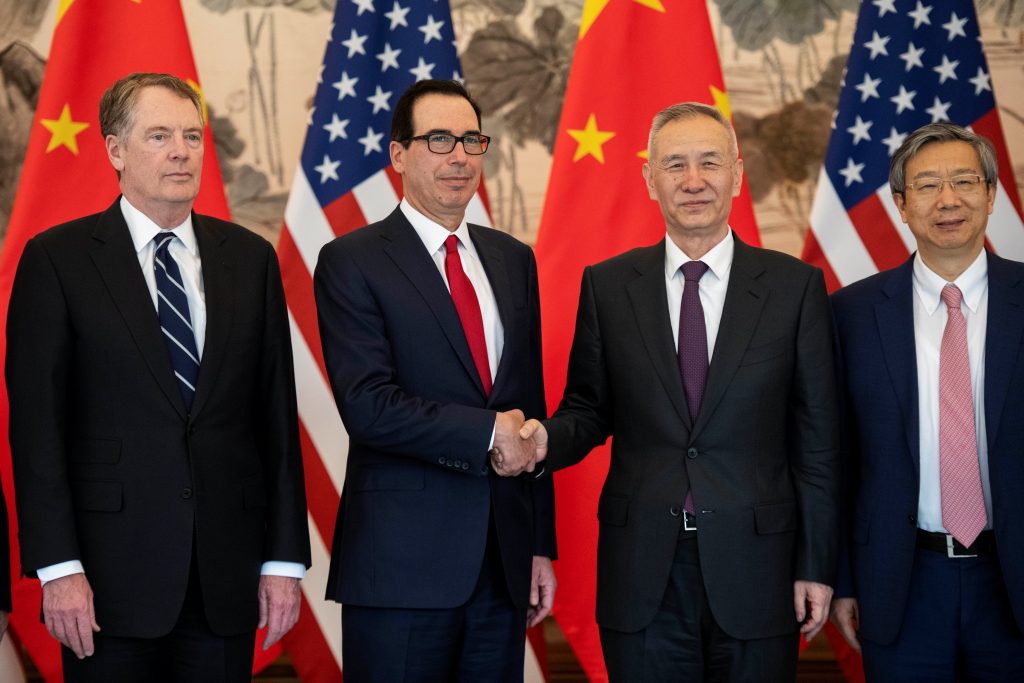Media Report

- Reuters reports, "U.S. negotiators have tempered demands that China curb industrial subsidies as a condition for a trade deal after strong resistance from Beijing, according to two sources briefed on discussions, marking a retreat on a core U.S. objective for the trade talks. The world's two biggest economies are nine months into a trade war that has cost billions of dollars, roiled financial markets and upended supply chains. U.S. President Donald Trump's administration has slapped tariffs on $250 billion worth of imports of Chinese goods to press demands for an end to policies - including industrial subsidies - that Washington says hurt U.S. companies competing with Chinese firms. China responded with its own tit-for-tat tariffs on U.S. goods. The issue of industrial subsidies is thorny because they are intertwined with the Chinese government's industrial policy. Beijing grants subsidies and tax breaks to state-owned firms and to sectors seen as strategic for long-term development."
- The New York Times reports, "Just as he had on previous trips, Zhu Feng bolted down his lunch at a Los Angeles airport before sprinting to catch his Air China flight back to Beijing. Suddenly, two F.B.I. agents blocked the Chinese scholar at the boarding gate and ordered him to hand over his passport. They flipped to the well-used 10-year visa to the United States and crossed out the page with a black pen. 'Go back to China,' Mr. Zhu, a professor of international relations, recalled an agent telling him during that visit in January last year. 'You will receive a notification.' In the four decades since China and the United States normalized relations, Washington has generally welcomed Chinese scholars and researchers to America, even when Beijing has been less open to reciprocal visits. Republican and Democratic administrations have operated on the assumption that the national interest was well served by exposing Chinese academics to American values."
- Reuters reports, "Chinese bombers and warships conducted drills around Taiwan on Monday, the latest military maneuvers near the self-ruled island that a senior U.S. official denounced as "coercion" and a threat to stability in the region. The United States has no formal ties with Taiwan but is bound by law to help provide the island with the means to defend itself and is its main source of arms. China has stepped up pressure on Taiwan, whose President Tsai Ing-wen Beijing suspects of pushing for the island's formal independence, a red line for China which has never renounced the use of force to bring Taiwan under its control. 'Any attempt to influence Taiwan through threats or coercion, we believe, destabilizes the region and threatens stability in the Taiwan Strait,' James Moriarty, chairman of the American Institute in Taiwan, said at a ceremony to mark the last four decades of U.S.-Taiwan relations."
Calendar
- 2019-04-14 A trade deal might help China's needed reforms
- 2019-04-12 As U.S. and China Near Trade Deal, Enforcement Is Key
- 2019-04-11 China Sweetens Its Cloud Offer in U.S. Trade Talks
- 2019-04-10 Trump Has a Message for the World: My Trade Wars Aren't Over Yet
- 2019-04-09 The EU and China Rescue a Plan to Present United Front to Trump
- 2019-04-08 Chinese woman arrested at Trump's Florida resort to remain in custody
- 2019-04-07 EU official confronts China on trade promises
- 2019-04-05 ‘Epic’ China Trade Deal Near Completion, Trump Says, but Haggling Continues
- 2019-04-04 Philippines' Duterte tells China to 'lay off' island in disputed waters
- 2019-04-03 China-U.S. Trade Talks Enter Crunch Period as Liu Arrives in DC
News
- Reuters U.S. waters down demand China ax subsidies in push for trade deal
- The New York Times F.B.I. Bars Some China Scholars From Visiting U.S. Over Spying Fears
- Reuters U.S. denounces "coercion" as China conducts drills near Taiwan
- Financial Times German regulator says Huawei can stay in 5G race
- CNBC Huawei is 'open' to selling 5G chips to Apple for iPhones, marking a big shift in strategy
- The New York Times In Search for Leverage, Trump May Be Undercutting His Own Trade Deals
- Bloomberg China to Consider U.S. Request to Shift Tariffs on Farm Goods
- The New York Times One Month, 500,000 Face Scans: How China Is Using A.I. to Profile a Minority
- Bloomberg The $18 Billion Electric-Car Bubble at Risk of Bursting in China
- The New York Times In Australia, Muslims Call for Pressure on China Over Missing Relatives
- CNN 30 years after Tiananmen massacre, Taiwan shows another way for China
- The Wall Street Journal China Investigates Ericsson Over Licensing as 5G Competition Heats Up
- Reuters China seizes record ivory tusks, busts smuggling gang
Commentary
- Financial Times Why Donald Trump is great news for Xi Jinping
- The Wall Street Journal China's Dangerous Monopoly on Metals
- Financial Times A trade deal might help China's needed reforms
- CNBC Europe may be playing spoiler to the elusive US-China trade deal
- The National Interest Why Does China Suddenly Want Nuclear Icebreakers?
- Bloomberg China's Secret Weapon in the Electric Car Race
